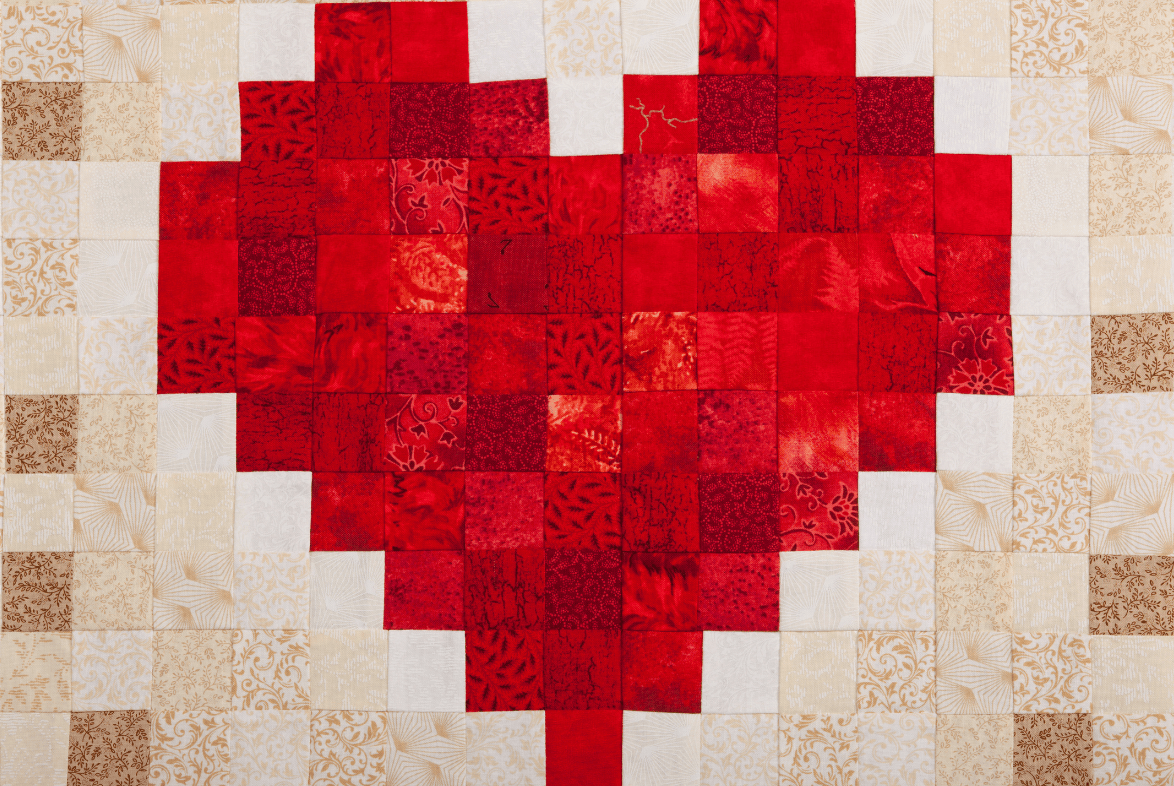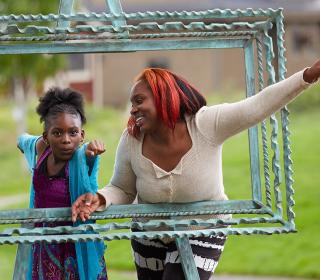It all began in the mid-1990s with Sandy Bonsib and New Beginnings, a domestic violence shelter that served battered women and children in King County. Under Sandy’s guidance, a group of 30 - 40 quilters met every month in Lake City Way’s quilt shop, In The Beginning, to create quilts for donation. In The Beginning donated both its space as well as yards of high quality discounted fabric for each quilt the group made, allowing them to create countless quilts for the women of the shelter.
After In The Beginning's closure, the Flying Colors quilter’s group moved to different shops around the area so they could continue to meet the needs of the New Beginnings shelter. When Sandy moved to Indiana in 2018 to begin a similar group, Penny Hazelton took over coordinating donations. Starting in 2020, Flying Colors became interested in YWCA and began donating their quilts to our Phillis Wheatley branch, which distributes the quilts to our Central Family Emergency Housing programs.

Since the 1990s, Flying Colors has donated over 5,000 quilts to local women's shelters.
For some in their group, the challenges these women face is a very personal matter. “Several of our members over the years have had family members or other people who have really struggled with domestic violence in particular, or homelessness. It’s something many of us are lucky not to have experienced,” says Penny. “[The work we do] is a small way to say, ‘Can we help?’ and ‘Here’s what we can do.’” Flying Colors created approximately 30 - 40 quilts a month for the New Beginnings shelter, and over the last 2 years, they have made over 400 quilts for YWCA, as well as pillowcases and scarves.
But the COVID-19 pandemic put a halt to their usual activities.
“Many of our group-members are elderly or have health issues,” explains Penny. “We were concerned about everyone, but there were a lot of us who wanted to keep sewing. YWCA was appreciative of the quilts we were making, so we wanted to continue.” Although Flying Colors stopped meeting in person, this by no means dissolved the community they’d built. “I’m the lucky person,” Penny says with a laugh. “I’ve met people in parking lots, in coffee shops, all masked and gloved and being careful not to make anyone sick, just doing whatever the circumstances required at the time to be able to keep giving quilts.”
Flying Colors continued to do “Show and Tells” and shared photos of their quilting projects even though they no longer met face to face. “We get a lot out of this other than the notion that we’re giving something colorful, warm, handmade, and usable [to these women] during circumstances that made their lives difficult. We’ve learned a lot from each other, and many of us are just starting. It’s not a one-way experience for any of us.”
Building Communities through Compassion
Although Sandy is no longer the leader of Flying Colors, her legacy of supporting survivors of domestic abuse lives on. Compassion called many people to the group, and it’s the key that continues to hold Flying Colors together. As Penny explains it, “Many of us are mothers or grandmothers, [but] even the women who didn’t have children have nieces and nephews. All of us felt a need to try and do something that would benefit other people who were in distress, and who were in one of the worst places they’ve ever been in their lives. I think compassion for people in those circumstances was one of the reasons why many people were drawn to [Flying Colors].”

Depending on the complexity of the pattern and the size, some quilts can take between 8 - 12 hours to make. Penny says she typically makes between 10 - 20 quilts each month.
To Penny and the rest of her group, creating security for women and families is paramount. “We didn’t ask a lot of questions; we just filled a need that they had. For all of us who make quilts, whether they’re for family members or for someone we don’t know, it’s a labor of love. It’s something we love to do, and we’re so happy to be able to share that with other people.” For many members of Flying Colors, the notion that they could make a difficult situation a little easier for someone was a big draw. Those fleeing abuse sometimes leave their homes without very much. "Having something warm and colorful to have as their own during a traumatic experience can often be a great comfort," says Penny. “We hope [these quilts] make them feel like someone cares for them.”
Looking Ahead
As many businesses and community organizations return to in-person gatherings, Penny and her group are considering their options. “Many of us are of an age where we have to be careful, but we’ve found a place where we can meet. We will probably meet to show the quilts we’ve been working on and that’ll be it, but that’ll be nice. I usually take pictures of all the quilts before I take them to YWCA, but it’s not the same.” Penny emphasizes the importance of coming together and maintaining their community, especially as Flying Colors expands and hopes to welcome new members into the group. In terms of donations, Penny hopes the group can start making even larger quilts for the women YWCA helps.
“We appreciate that YWCA is interested in what we’re doing, and we’re happy to help out. The ladies in our group are a wonderful group of people and they love making quilts, so it really is nice to have an outlet for our passion that also may help other people. We appreciate being part of the effort to make people’s lives a little bit better.”
Sign up for our monthly newsletter to find out how you can support domestic violence survivors in your community, and make sure to join YWCA at our upcoming Stand Against Racism Event.
Ana Rodriguez-Knutsen is the Content Specialist for YWCA's Marketing & Editorial team. From fiction writing to advocacy, Ana works with an intersectional mindset to uplift and amplify the voices of underrepresented communities.
We share the stories of our program participants, programs, and staff, as well as news about the agency and what’s happening in our King and Snohomish community.


